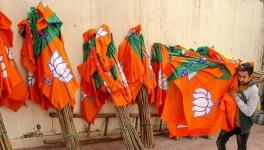Bengal: Beedi Workers Grapple to Survive, Access Welfare in Jangalmahal
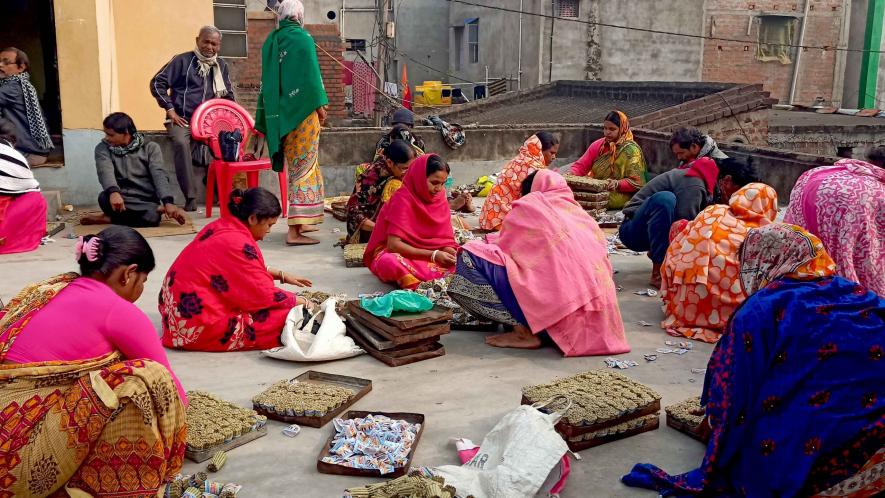
Women Beedi workers have been submitting beedi at Usha cooperative factory Bankura. Picture by Madhu Sudan Chatterjee
Six years ago, Mithu Das, a 45-year-old female beedi worker from Shyamdaspur, under Bankura 2 Block in Bankura District, received Rs 37,500 as the first instalment of the subsidised house-building project from the beedi welfare organisation under the central government’s labour department. With that money, she started constructing a two-room house, but her house could only reach ground level.
Months and years have passed, but she has not received the money for the second instalment. After two years of living with her family in a makeshift dwelling, unable to bear this painful situation, she took a high-interest loan from a Microfinance Company and completed her small two-room house. Her husband also has no fixed income.
Mithu makes 500 beedis from early morning to late evening, among other household work, including cooking. Even if she wants or can make more, she cannot make more than that number because she has been given ingredients (Kendu leaf, tobacco, and yarn) that can only make a maximum of 500 beedis per day. She gets 90 rupees for 500 beedis.
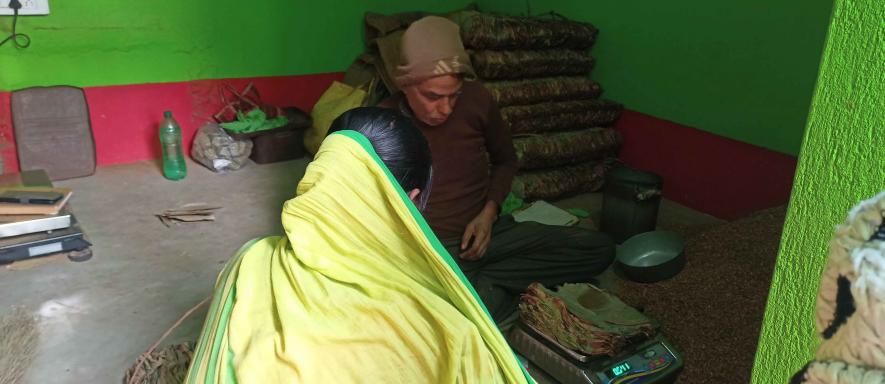
Given Kendu leaf and tobacco for making beedi
She is a cooperative beedi worker, so she gets 180 rupees as wages for making a thousand beedis. Those who work for a private owner, get Rs 100-130 rupees per thousand. “How will I run the family or repay the high-interest loan for building my house?” asks Mithu. Like her, in Bankura and Purulia’s Jangalmahal areas, more than one and a half lakh beedi workers are suffering from an extreme crisis of survival today.
According to official data, there are about 70 thousand beedi workers in Purulia and 15 thousand in Bankura District. The Beedi Welfare Organisation gives them identity cards. However, according to various organisations of beedi workers, there are about 1,30,000 beedi workers in Purulia and 25,000 in Bankura. Around a lakh of these workers are women.
Kamal Ranjan Singha Ray, the officer-in-charge of the Beedi Welfare Organisation in Bankura, said that those who make beedis must come to their office and show making beedis. Then the organisation gives them identity cards as beedi workers. According to the organisation, there are around 15,000 cardholding men and women beedi workers in Bankura.
An office bearer of the Beedi Welfare Organisation in Purulia, who did not wish to reveal his name, said that the identity card is issued in the district in the same manner. There are 70,000 beedi workers holding identity cards in Purulia District.
Bhiguram Karmakar, District secretary of Bankura Zilla Biri Karigar Union (affiliated to CITU), and his counterpart from Purulia, Bhim Kumar, both said many workers are outside the official information. The workers make beedis but do not get identity cards. The Beedi Welfare Organisation has issued no identity cards to those who started working in the last three years, they said; so, how will the government have the right information? Women workers are a big part of not getting this card. According to the union leaders, these two Districts together have more than one and a half lakh beedi workers.
Currently, beedi workers in the Jangalmahal area are grappling with job insecurity and low wages, a crisis gradually intensifying daily. Uncertainty looms over the possibility of securing work, even when submitting beedis to the owners. This crisis can be traced back to a campaign initiated by the Central Excise Department a few years ago. The campaign mandated the inclusion of images depicting skulls and cancer on the labels of beedi bundles, inducing mental distress among the population. As a consequence, beedi production dwindled, prompting a resistance movement by beedi workers.
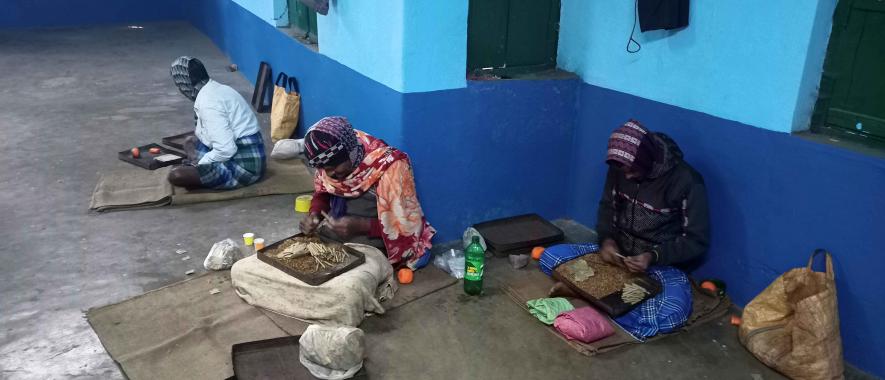
Beedi workers are making beedis at bankura cooperative biri factory.
“Through our sustained efforts, we successfully halted the use of such distressing images. However, the current mandate now requires the inclusion of pictures depicting lung patients on beedi bundles. Our contention is that the government has the authority to shut down the beedi industry without enforcing these distressing pictorial requirements. Regrettably, the government has not taken such measures and, instead, imposes a 28% Goods and Services Tax (GST) on beedis,” the union leaders said. The situation worsened during the COVID-19 pandemic, leading to the closure of many factories. Additionally, there is a scarcity of job opportunities in rural areas, exacerbated by the suspension of Mahatma Gandhi National Rural Employment Guarantee Act (MGNREGA) projects for nearly three years, they added.
Mohan Garai, President of the Bankura Cooperative Biri Factory, told NewsClick, “Mostly comprising poor and marginalised individuals, the customers of beedis are significantly impacted. Many struggling to sustain their families are compelled to discontinue beedi smoking due to financial constraints. Consequently, beedi production has witnessed a sharp decline, reaching a critical low.” He emphasised the challenges workers face in obtaining suitable employment, with many transitioning to alternative occupations, including construction work. The younger generation of men also shows a reluctance to enter this field, leading to a predominance of women among beedi workers.
In Shyamdaspur of Bankura, where 300 families reside, over 200 are families of beedi workers. In these households, at least one woman is engaged in beedi making, while men seek employment in other professions. Hence, the burden of familial responsibilities primarily falls on women.
Bina Chandra, a 45-year-old housewife, said that her husband, Somnath, used to make beedis. However, after his diagnosis of chest pain disease, she assumed full responsibility for the family. Her elder daughter, Sanchita, is pursuing her second year of Bachelor’s degree at Beliatore College, and the younger daughter is in the seventh grade. The family’s financial needs are met through Bina’s beedi-making work, where the opportunity is limited to producing 500 beedis a day.
Expressing concern over the inadequacy of the 90 rupees daily wage to sustain the family, Bina highlighted the financial strain. Witnessing her mother’s struggles, daughter Sanchita supplements the family income by providing home tuition to primary-level students, earning thousands of rupees monthly.
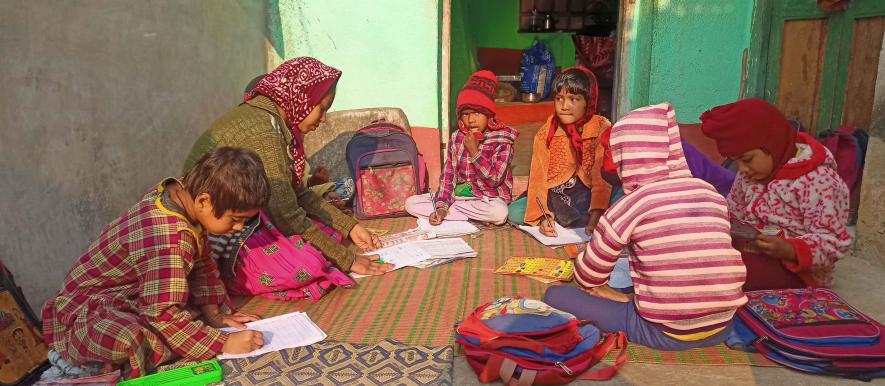
Sanchita Chandra daughter of beedi worker Bina Chandra has started home tuition for financial help of her family.
Bina revealed that her elder daughter’s marriage, which was scheduled for February, has been jeopardised. This is due to the fact that, as a beedi worker, she commenced building their house using the initial instalment from the Beedi Welfare Organisation, which subsequently stopped.
After four years of waiting, Bina managed to complete the house using funds originally saved for her daughter’s marriage. Additionally, she took a loan from a Microfinance Company, which remains unpaid.
Despite numerous attempts, Mamata Garai, a widow and beedi worker above 60 years old, recounted not receiving any instalment money for housing projects. Living in a dilapidated house, Mamata’s situation mirrors that of Somapti Rajak, Anjala Gatai, Binapani Garai and others. These families rely solely on their beedi-making work for sustenance.
In the Birudi village of Purulia District under Jhalda 1 Number Block and the Cheta village under Jhalda 2 Number Block, a significant number of families are engaged in beedi work, with approximately 80% being women workers. Individuals such as Bishaka Kumar (40) from Birudi and Tuntuni Kumar (50) from Cheta village reported that they did not receive any house-building funds from the Beedi Welfare Organisation. However, they noted that some workers did receive the first instalment.
In 2017, the Beedi Welfare Organization announced a subsidised housing scheme for beedi workers, offering one and a half lakh rupees with Rs 37,500 to be paid in each of four instalments.
Additionally, the Beedi Welfare Organization provided financial assistance to the sons and daughters of beedi workers up to university-level education, and maternity allowances were granted to women workers. However, these benefits are no longer available, as indicated by Bhiguram Karmakar and Bhim Kumar.
Numerous women workers, including Maya Garai, Namita Das, Purnima Das of Bankura, Kaberi Majhi, Nilima Sardar of Manbazar, Purulia, said that almost all of them experience health issues while making beedis. Common health problems include respiratory issues, spondylitis, tuberculosis, and skin diseases.
The mobile health centres operated by the Beedi Welfare Organisation are nearly non-existent, lacking medical professionals. In case of illness, workers are forced to rely on local government hospitals or private practitioners. The Bankura Beedi Worker Health Centre is managed by a nurse and a group D casual staff, and workers seldom seek medical attention there, according to Mithu Das. She highlighted the fact that they are not entitled to Employee State Insurance (ESI) facilities.
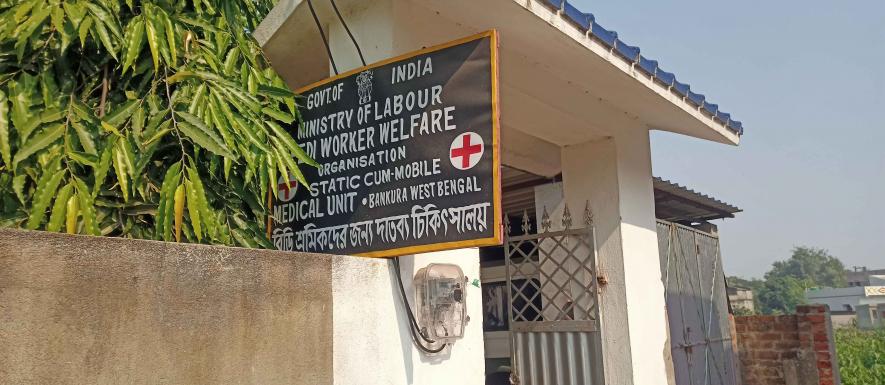
Beedi welfare hospital of Bankura
There is no beedi cooperative in Purulia District. Here, the individual owners do the business and a wage of Rs 171 is paid for making a thousand beedis. But not everyone gets this wage. Several touts in the beedi industry continue to dominate these two Districts of Bengal’s Jangalmahal region. They go to the remote villages and give women beedi-making materials to work for a wage of Rs 100 per thousand. Due to lack of work, they are forced to work for a measly wage, said several women workers.
Tuhin Subhra Majumdar, Assistant Labour Commissioner of Bankura, said the state government has set a wage of Rs 267 per thousand beedis for Bankura and Purulia Districts. He said this wage structure was announced three years ago.
Bhighuram Karmakar and Bhim Kumar asked why the workers were not getting these government-prescribed wages, which are not implemented by the state government’s labour department. Workers are being exploited indiscriminately, and women workers are more victimised, they said.
Several women workers in the two districts said running a family on this negligible wage was impossible. Additionally, they are suffering from several diseases. So, they said they intended to leave the beedi-making work and work as maids. Many female beedi workers have already become domestic workers.
Get the latest reports & analysis with people's perspective on Protests, movements & deep analytical videos, discussions of the current affairs in your Telegram app. Subscribe to NewsClick's Telegram channel & get Real-Time updates on stories, as they get published on our website.














